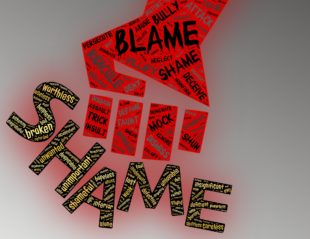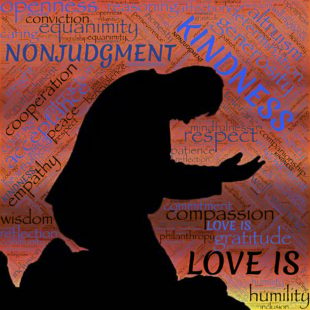Verbal Abuse: What is it?
Kristen Zuray
“You won’t amount to anything!”
“You’re crazy!”
“You can’t take criticism.”
“You twist things and make things up.”
“Hello, thunder thighs!”
“Here comes fatso!”
Verbal abuse is a tactic used to intimidate, manipulate, and control another person. Verbal abuse is also known as emotional abuse which creates deep psychological scarring. What are the forms of verbal abuse?
Removal of identity.
 The removal of a person’s name which is their identity is a way to dehumanize a person. Instead of referring to a person by their name, the abuser will refer to their victim in pronouns or by a description. An example of this could be: “Tell John’s wife dinner is ready.”
The removal of a person’s name which is their identity is a way to dehumanize a person. Instead of referring to a person by their name, the abuser will refer to their victim in pronouns or by a description. An example of this could be: “Tell John’s wife dinner is ready.”
That may not sound like abuse, but if the person has a relationship with John’s wife and knows her name but frequently refuses to call her by name, that’s a red flag. The removal of a person’s identity starts chipping away at their roots, weakening and priming them for manipulation. This lack of acknowledgment of their name sends a powerful statement of rejection and shows a lack of respect.
Objectification.
This is a way of reducing a person to a mere object. When verbal abuse occurs to an adult, it can bring them back to a certain age as a child in which they felt powerless. For some, though, they’re not brought back to a specific age, but to nothing.
They equate themselves to objects. “I was just a toy. I wasn’t allowed to have feelings, opinions, or ideas.” Another statement could be, “I was trash, just something to be tossed aside when I no longer served a purpose.”
Objectifying and the removal of a person’s identity (dehumanization) are very similar. The intent is to disregard another person’s emotions, intellect, and physical makeup to exert control. The abuser does not feel responsible for wrongdoing such as hurting another person’s feelings because that person doesn’t have feelings to hurt. This belief allows them to do whatever they want regardless of the harm they cause.
Attacking opinions and ideas.
 Have you ever been in a meeting in which you presented an idea and were immediately attacked for it? It’s perfectly fine to have opposing thoughts and ideas. For the most part, it’s healthy to be challenged and our perspective stretched. This can happen when respect is shown to an individual through active listening.
Have you ever been in a meeting in which you presented an idea and were immediately attacked for it? It’s perfectly fine to have opposing thoughts and ideas. For the most part, it’s healthy to be challenged and our perspective stretched. This can happen when respect is shown to an individual through active listening.
It’s not okay when an opposing viewpoint is shared and that person is immediately criticized, made fun of, and dismissed. The goal in this conversation just shifted from finding common ground to “it’s my way or the highway.” Often the purpose of the attack is to call into question the victim’s sanity, bully them into silence, and cast fear into others who may dare speak up for the sole purpose of gaining a personal benefit.
Criticizing a person’s appearance.
Appearance is another form of identity, a physical identity. The goal here, as with all verbal abuse, is to make the abuser feel better about themselves and their looks. If they can make the victim insecure about themselves, they will become emotionally weakened. The attacker can use this to manipulate the victim into appreciating that they are still being “accepted” even though they look “ugly.”
It’s also a way of objectifying a person. In some schools, a list will be made of the ten hottest girls or boys in the school. What happens to the emotions of the girls/boys who don’t make the list? What happens to the one who made the list but was only in 10th place?
Men will tell their wives that they have a “certain type” of woman they are attracted to. Often than not, the wife doesn’t fully fulfill all the things on the wish list. Fathers will tell their sons what type of girl to find appearance-wise. She needs to be skinny, dark-haired, short, tall, meaty, etc. This behavior is a way of withholding approval and love, therefore, making a person conform to fulfill another’s fantasy.
Public humiliation.
Any form of “joking” that casts a shadow across the character of a person, public name-calling, and questioning a person’s ability are just some examples of public humiliation. When the intent is to sway people to look unfavorably upon another person is abuse.
Withholding affirmation.
 Offering criticism seems to be an easy thing to do, but giving affirmation is harder. Giving praise means that the giver has to have a humble heart which does not define an abuser. I used to work for a boss that made sure I knew everything that I was doing wrong, but he never told me what I was doing right.
Offering criticism seems to be an easy thing to do, but giving affirmation is harder. Giving praise means that the giver has to have a humble heart which does not define an abuser. I used to work for a boss that made sure I knew everything that I was doing wrong, but he never told me what I was doing right.
This created a burden of stress because I began to believe I was an incompetent failure. This belief turned into fear. The lack of encouragement and praise is another form of abuse because what is instilled is a false identity that creates insecurity and fear. Isn’t that the whole intent of verbal abuse?
Painting a hopeless future.
“With grades like that, you’ll never amount to anything!” A comment such as this will have two results. It will create a workaholic who tries to disprove this statement, or it will create a quitter who will no longer care or try. Words can direct a person’s future.
Silence.
Actions speak louder than words and so do silent treatments. The silent treatment is a form of rejection and emotional abandonment. With no end in sight to this harsh punishment, the victim will become fearful, hopeless, and emotionally disoriented.
Often, the victim is rejected with no knowledge of what they’ve done which means they are deprived of the opportunity to make things right. Silence is worse than verbal. The damage done by silent treatments runs deep and is harder to heal from.
If you are in a situation in which you are being verbally and emotionally abused, there are steps that you can take to protect yourself.
Pray for the abuser.
This may not sound like a good thing to do, but prayer does create armor for your heart. “But I say, love your enemies! Pray for those who persecute you!” – Matthew 5:44 (NLT). You may not see instant change with them, but you will feel God’s protective covering over you.
 Understand who you are.
Understand who you are.
God has called you by name. He has given you an identity. You are redeemed, child of the Most High God, precious, chosen, a royal priesthood, priceless. This is you! Don’t let anyone take that away from you. Stand firm in your identity.
Set your boundaries.
I highly recommend reading Dr. Henry St. Cloud’s book, Boundaries, or watching his YouTube videos. When God tells believers to turn the other cheek, he doesn’t mean that they have to submit themselves to continued abuse.
Tell the person how their words are making you feel and the damaging effect it’s having on your life. If they won’t hear you, set consequences. “If you continue to embarrass me in front of my children, Mom, then we won’t be able to come over anymore.” “If you continue to disrespect me, Boss, I’ll have to go to HR or even find another place of employment.”
Separate.
If you have gone to the person and have tried to reason with them, and they fail to respect you and your boundaries, then it may be time to separate. This could be only a season allowing them time to reflect on their behavior or it may be permanent. Continuing in abusive relationships is not an option.
Stop the cycle.
When you look into why abusers abuse, you will often find a traumatic childhood history. Some will experience parental abandonment. To protect themselves from experiencing that loss again, they will learn to control their environment. If left unchecked, this can result in becoming excessively controlling parents.
Depending on the severity of the abuse, children will learn to survive by any means necessary. This survival carries on into adulthood. The abused often become the abuser, but it doesn’t have to be that way.
A victim can choose to stop the cycle and turn their story into one of hope and love for others. By confronting the pain of the past, bringing God into those wounded places, and reclaiming your identity and purpose, you will be empowered to stand up against the abuse both past and present. If you are having a difficult time understanding your story, contact a counselor or coach who will help guide you on your journey to healing.
“Not Listening”, Courtesy of Counselling, Pixabay.com, CC0 License; “Shame”, Courtesy of Johnhain, Pixabay.com, CC0 License; “Shame”, Courtesy of johnhain, Pixabay.com, CC0 License; “Love”, Courtesy of johnhain, Pixabay.com, CC0 License





